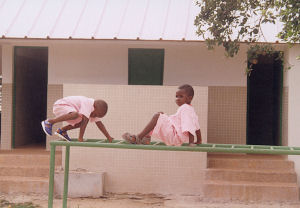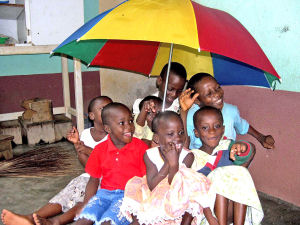IVORY COAST

In Ivory Coast, about 7% of the adult population is affected by HIV/AIDS and about one-third of all orphans - 310,000 - have become orphans as a result of HIV/AIDS. HIV/AIDS affects children's lives in many ways: it makes them vulnerable to malnutrition which in turn causes them to miss school and so they are forced to work in order to survive. The fact that such a large number of children are infected seriously impedes economic growth; orphans who are infected in turn become HIV positive parents.
SOS Children supports families and communities, especially orphans and vulnerable children, to help to break this vicious circle and in the fight against HIV/AIDS and poverty.
FAMILY STRENGTHENING PROGRAMME IN THE IVORY COAST

It is becoming more and more difficult for extended families to take care of children as the number of orphans increases. In addition, since the civil war which began in September 2002, many of the families have had to care for several children in addition to their own. Their ability to provide the help that they have traditionally given is very limited or even non-existent. In addition to this, husbands of women who are known to be HIV positive are often pressured by their relatives to abandon these women and their children.
SOS Children's Villages' family strengthening programme in the Ivory Coast aims to:
make it easier for children to have basic health care, a balanced diet and an education
ensure that families acquire the skills and knowledge they need to meet their children's needs
support local communities so that they can take care of orphans themselves.
SOS Children's Villages works with local community organisations to identify orphaned and vulnerable children and their families who are in need of help. Once a month, a food package is given to families, according to the number of children in the family. The SOS Medical Centre provides basic care. Local community groups provide psychological and legal support. Children who have dropped out of school are encouraged to get vocational training, for example dressmaking for young girls.
SOS Children also works with local community groups to help families with vulnerable children to generate income. Working with four such groups SOS Children has already helped 168 families, with 376 children who had an income of less than 60p a day. These families are unable to provide for their children.
The programme's priority is to give back to the families a sense of human dignity, particularly by involving them in income-generating activities. In the first 18 months of this programme, 64 families have learnt how to manage a small business. The programme has already had a very positive impact. The families' incomes have increased. Amala, for example, has made a profit from selling fish and intends to open an oil palm plantation; Dona, a grandmother who cares for several small children, has bought a second refrigerator to enable her to sell more cold water, ice-cream and fruit juice.
SOS Children will continue to support these families by:
encouraging them to be self-sufficient in the long-term: managing their own finances, helping their children to progress and improving their living conditions
developing and consolidating the capacity of local community groups to support the development of orphaned and vulnerable children
creating family committees in each district, led by the people who are taking part in the programme, to manage the programme themselves.
SOS Children has opened clinics in both Abobo-Gare and Aboisso to help families and children in need especially those affected by HIV/AIDS. This includes helping local communities with food, medicine, school fees, setting up self-help projects.
If you interested in helping the situation in the Ivory Coast you might like to consider how to sponsor a child in the Ivory Coast.